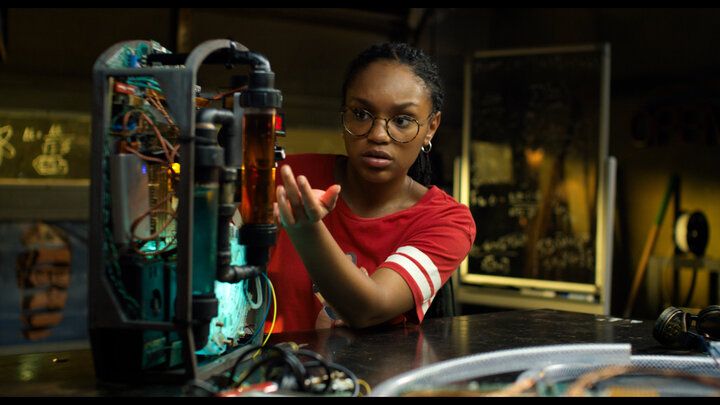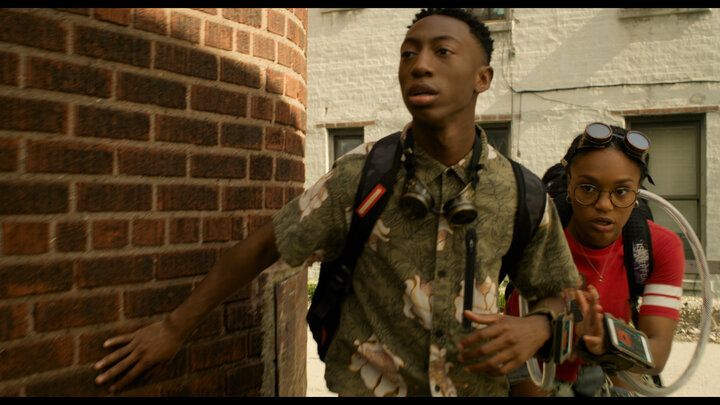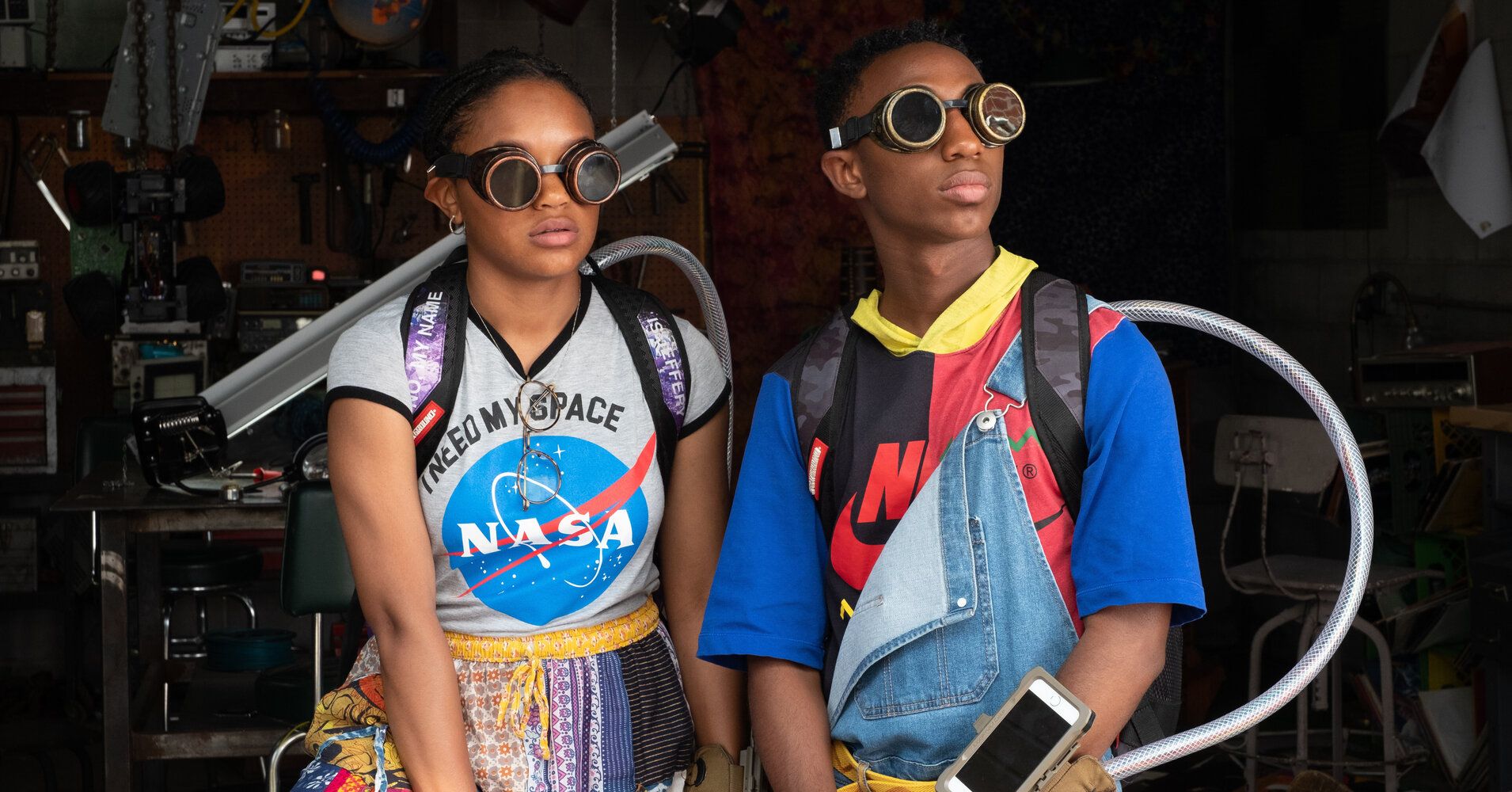[ad_1]
“See You Yesterday” is like no story you’ve seen before.
The Netflix film, an Afrofuturistic tale led by a social justice narrative, came from the mind of Stefon Bristol, Spike Lee’s mentee and a graduate of Morehouse College. With the help of co-writer Fredrica Bailey and executive producer Spike Lee, Bristol paints a vivid picture of what it means for two black kids from Brooklyn to fight to change the world via science.
The film’s protagonist, C.J. Walker (Eden Duncan-Smith) is a young scientist, entrepreneur and unapologetic black girl who discovers how to time-travel along with her best friend, Sebastian Thomas (Danté Crichlow). And though time-travel films can feel a bit too removed from reality to be taken seriously, “See You Yesterday” is grounded in a harsh reality when C.J. and Sebastian find themselves using their machines to go back in time to save her older brother from getting killed by an overzealous cop.
Bristol and Bailey spoke to HuffPost about their intention in making “See You Yesterday,” the importance of a diverse film crew and letting their art imitate life to remind audiences that black lives still matter.
Can you talk about how you both have gotten involved in this? What was the genesis of your involvement in this project?
Stefon Bristol: I was a graduate student at NYU and I needed to work on a thesis to move on to graduate as a director, and I needed to make a film. At that time, my professors were saying I was ready to make a feature film, and I wanted to do a sci-fi movie and I came up with the idea of “See You Yesterday.” It was somewhere between when Eric Garner and Mike Brown got murdered and I was working on another script about time travel, but their murders bled into my script and a professor of mine said, “There’s a police brutality scene in this movie, you either leave it in or take it out, and if you leave it in, it has to be at the forefront of the story.” I said, OK, then I’m going to stick to it because I know it’s just going to continue happening.
For me to get a feature film made, I needed proof of concept, which is a short film, and I wrote it myself at first and I was going to shoot it. However, I had pretty bad producers and I fired them. It was a really bad experience. Once I had to cancel production, I cried for a week. Literally, it was really, really bad. I was on the verge of depression. I hit up the dramatic writing department at NYU and asked the chair, “Do you know anyone that is interested in a script like this?” He read it and he brought me a list of people, and Fredrica is one of them. I interviewed her.
Fredrica Bailey: A very stern interview.
Bristol: It wasn’t too stern. … It was really that bad?
Bailey: No, you were very professional. You were very cool. You were like, let me see your credentials.
Bristol: She showed me two scripts she had done. It was very well written. And her being a black woman was a plus because this film deals with black women, and I needed that voice, and she helped me write the short script and it made sense to do the feature.
What about this project drew you to it, Fredrica? Why did you want to be involved?
Bailey: It’s something I hadn’t seen before. Stefon and I both love genre, we love action/adventure, we love sci fi, but this particular project also says a lot, has a message. It’s making a social commentary on society, and it pushes the envelope.

I think that this film is a testament to what happens when you have people who are of different backgrounds and of different representations behind the scenes creating. Could you talk about that and how intentional it was to make sure that folks who were putting their hands in and making sure this came to life … not only were they representative of us and different backgrounds and genders but also like, aware?
Bristol: In production, I had to make sure that we hired a diverse background, and Netflix was very supportive of that. First of all, I had really, really good executive producers who Spike brought in for me, Jason Sokoloff and Matthew Myers, and they were really sensitive to the material and understood what I was trying to do, so they allowed me to do my thing. And I said OK, we’ll bring in diverse people, and I brought in Charlese Antoinette Jones. She’s my costume designer. She did Shaka Kings’ “Newlyweeds.” I needed the costumes to be legit, they’re rigged up on real Brooklyn kids who are not only into science but are very knowledgeable about their environment and what they’re wearing and I can’t slack on that.
And then I brought my editor, Jennifer Lee, and she has an extremely keen eye on storytelling, very knowledgeable on how to make a really good story out of footage and movie. She challenged me a lot, and she saved my movie many times during the process. There is supposed to have been 10 … eight to 10 months process, and every step of the way she knew how to tell the story. She made sure my intentions were right, her intentions were right, the whole team’s intentions were right from the special effects from Hey Beautiful Jerk, to the music from Michael Abels, to the sound design from Ruy Garcia (God bless his soul). One morning he stayed up till 2 o’clock in the morning to finish my film. This is the man who did “Roma.” We had a really, really strong group of people that was very professional, very experienced, and they decided to work with a first-time filmmaker and I appreciate that.
Bailey: Well, I mean, I do feel like that was always the intention. I know you and I would talk, still working on the script … the intention was always to bring in many different people, diverse, of all backgrounds, to bring forth the realization of the film. I think we really accomplished that.
Bristol: And the production designer is a woman too, Jimena Azula. And she is Peruvian; she understood culture here and there. We hired a lot of women in this film, in the camera department, post-production was a lot of people of color, and that’s very important to me.
C.J. Walker, I was so struck by her character and felt as if it was a look back into me as a kid and girls I knew growing up. She’s this strong West Indian young girl who is smart and isn’t taking anything. I’m wondering about the intentionality that went into crafting her character. What did she stand for and how did you model her?
Bailey: C.J., she always just leapt off the page and she’s always been a very strong character, very much a leader, and just very bold, very brazen. She’s one of those people where, when she decides something, that’s it. She is moving forward and you can move with her or step out of the way. In that way, I feel like she’s in some ways what many people would like to be like. In real life, many people, we hold back, we kind of think about consequences and things, and C.J.’s more like, “This is what it is.” So, I think we are very purposeful in crafting her in that way. I can say she has a lot of Stefon in her. She has a lot of Stefon in her, but she also has that soft side and she’s very reflective, in life and the things she’s been through. So, I think she’s always been that way, always been headstrong and very vibrant.
Bristol: And the function of her character is to be unapologetic, especially with what’s going on. To figure out what is going on with police brutality, we cannot apologize, we cannot be … we got to stick to it and be headstrong and be rude as possible, because death is real, and death in the hands of people who are supposed to be professional with a badge and a gun, who are supposed to be trained for it … you got to be unapologetic to hold them accountable. Her character’s function is that.
I kind of want to dig into this decision you made to keep this story revolving around police brutality.
Bristol: We’ve had many conversations.
How did those conversations go and what was your decision to approach it in this way, because it’s such a heavy topic, and when you’re writing about it and working on it, I’m wondering what your conviction was to make sure this story was told and this narrative was at the forefront of this story?
Bristol: I’m annoyed by it, and I’m tired of it … the only way we can get over something and go through it. We got to get to it. I know that it’s going to be a continuing topic, I know people are tired of seeing black bodies being killed onscreen, if it’s through social media or in movies, I’m tired of it. For some kind of resolution, some kind of answer, some kind of accountability, within the justice system, within this system in general, we have to keep talking about it.
Bristol: I feel like a lot of people and especially the audience that I’m going to serve, not just for black people but also another audience that I’m going to serve, for them to see a different side of this narrative of police brutality. We have often ― young black men or young black women are killed by police and there’s some kind of segment saying that “Oh, they robbed a store before” or “They are smoking weed in their apartment, so there’s a blemish on them, and that’s the reason why they should get killed.” None of my characters, you will never see them in any negative light and they’re very loving people, a very respected family and I hope that you’ll love them for them, so when the inevitable happens, you’ll feel what they are going through as a family.
You see them as kids being kids. We don’t get to see ourselves as being kids all the time.
Bristol: Exactly. A lot of adults, and teachers in school too, see this on young black people. They don’t see them as kids. That’s why they’re always getting detention or thrown out just because they throw a tantrum, but when white students throw a tantrum or get into fights, they get good counsel. Not black students.

I’m also wondering about the decision to make this an Afrofuturistic film. It’s really refreshing to see the Octavia Butler book in the beginning and black kids time-traveling. There’s a joke that black people don’t talk about time travel because what point are we going to go back to? The vehicles in which this film uses time travel and uses STEM ― it’s so important and I wanted to get your perspectives on why that’s so important. It may not be revolutionary for people who may not understand why this is needed for us.
Bailey: I think it’s important to show our kids and our youth an interest in science and math. … Usually when we see ourselves, it’s with entertainment or sports; that’s great as well, but there is also the reality that we do this too and do it well, and we’re excelling in it and I think it’s important to show that on the screen so that the kids that are actively doing it now can see themselves and be able to say, “That’s me up there.” Also, the kids who are not looking at that as an avenue can look at it and say, “Maybe that’s something I can do too.” I think it was important for us to be able to have people look at it and see their reflection, and also have other people look at it and be inspired … to say, “You know what? This is another avenue I can take, that I can make good, that I can prosper, that I can move forward.” I think that was really important for us.
You can’t be it if you can’t see it.
Bailey: Exactly. If you don’t see yourself, then how do you aspire?
Bristol: To a point, there are so many African American inventors or just people in STEM who we don’t know through our history … and that’s the reason why I named the main character C.J. Walker, so people can research Madam C.J. Walker and figure out who are the people in history who are an example of her? Mae Carol Jemison, we have Neil deGrasse Tyson, Lonnie Johnson (who did a Super Soaker) or we got Jerry Lawson, because of him we would have Super Nintendo Entertainment System, N64, Game Boy … there’re ways to fulfill your life in the science field.
And we need more black people in science to help with climate change or what have you, and in Congress to pass certain laws. Science is beautiful. Shout out to Eden Duncan-Smith, the lead actress. She is a scientist herself, not just an actress, she goes to Hampton University, studying physics, and she has a work-study with NASA.
I love that. What about Spike’s involvement to make sure this film got the love and the access that it needed? I know he’s your mentor, Stefon. Could you talk a little about his involvement and how he supported it?
Bristol: I’ve known him for eight to nine years now. I worked for him, interned for him, took his classes at NYU (he’s a tenured professor right now at NYU). … Once he helped with the short, he asked me if [I wanted him] to be a producer for my film. He told me to think about it. There was nothing to think about. We’re doing this, baby. He read our script together from draft 1 to draft 13, he pitched it to studios, and since the third draft, he wanted to try to get the movie made. Fredrica and I knew that would happen, but once we got notes back, they were still very interested ― and we were saying, screw them, we’ll go to someone else, and he’d say no, no, no, let’s continue to work on the script and then we can go back. So we said fine, we will work on it. I didn’t imagine Netflix would get involved. I did not. He took it there, and we did a studio film.
Bailey: Yes, he’s super supportive. Like Stefon was saying, he teaches at NYU, and I was in another department, but he was gracious enough to invite the students and the dramatic writing department to come to his classes so I was going to his classes on Thursdays, his film classes, and that’s where I got a chance to really meet him. He’s just been a godsend. He’s so great.
What do you hope that audiences take from this film?
Bailey: I feel like everyone’s going to take something different from it so I think my main goal is to continue the conversation, to keep bringing to the forefront police brutality. But I want people to take from it what they bring to it, and that’ll be different depending on people’s life experiences. If you had direct issues with police brutality, then I think you’ll take something separate from it than someone who maybe is looking at it from the aspect of having lost a brother, or the aspect of being from Brooklyn. I don’t want to tell people what to take from it. … I’m very interested to see what people take from it based on what they bring to it from their experience, and I think that will be different for different people.
Bristol: I’ll let the audience have their own interpretation, please.
This interview has been edited for clarity and length.
REAL LIFE. REAL NEWS. REAL VOICES.
Help us tell more of the stories that matter from voices that too often remain unheard.
[ad_2]
Source link

